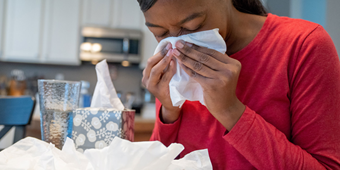The Link Between Allergies and Asthma

Find Your Perfect Match
Answer a few questions and we'll provide you with a list of primary care providers that best fit your needs.
Have asthma? If the answer is yes, chances are good you also have allergies. And those allergies can trigger an asthma attack, or make it worse. Allergic asthma — also known as allergy-induced asthma — is the most common form of asthma. It affects more than 10 million Americans. If you’re allergic to pollen or ragweed, for example, your allergic asthma can be activated.
If you have allergic asthma, ask your doctor about treating your allergies. Allergy testing or skin and blood tests can help pinpoint what you’re allergic to. Because allergic triggers are highly individual, yours may be very different from those of others with asthma.
Knowing your allergy triggers can help you avoid or control them. They include:

- Tobacco smoke: Smoking cigarettes isn’t healthy for anyone, especially if you have asthma. Even “secondhand” smoke, from someone near you who is smoking, is harmful.
- Dust mites: Just about everyone’s house has dust mites – the tiny bugs that are drawn to bedding and furniture. Use special mattress and pillowcase covers to protect yourself.
- Cockroaches: Cockroaches and their droppings are bad news for asthma. Get rid of them by eliminating as many water and food sources as you can, and using traps and gels to cut down on their numbers.
- Pets: Curling up with your furry friend can launch an attack. If you can’t bear to give up your cat or dog, keep it out of your bedroom.
- Mold: Breathing in mold can set off asthma. Humidity encourages mold growth – fight back with an air conditioner or dehumidifier.
- Smoke from fires: Stay away from smoke that comes from burning wood or other plants, and avoid burning wood in your home. If there’s a wildfire in your area, you may need to stay indoors when pollution levels are highest.
Find Your Perfect Match
Answer a few questions and we'll provide you with a list of primary care providers that best fit your needs.
Source: Centers for Disease Control and Prevention (CDC)




